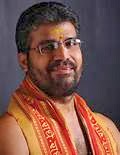The Process of Yoga : 3-7. Swami Krishnananda.
=========================================================================
Friday, February 02, 2023. 06:00.
Chapter 3: Recognising the Independent Status of Things-7.
=========================================================================
The atma-kamatva can be of two kinds: love of the bodily self and love of the true Self. The love of the bodily self is a spatio-temporal expression of the love of the true Self. There is a vast ocean within us, but that ocean is not seen. It seems that a little tap is connected to the ocean, and though the pressure of the entire ocean is behind the tap, it is not seen on account of the consciousness becoming restricted to the flow of water through the tap. This tap is the ego. But the ego is not merely like a tap, because through the tap we have only real water flowing and nothing else, but here things come in a distorted form through the ego. The ego is not merely a limitation of the ocean behind it, but a distortion of it. It is coloured, it is fragmented, and something else altogether, totally different from the original, comes through the ego. This is what we call the Asura in Puranic language – the Rakshasa. Though Rakshasas have come from God only, they assume a different character altogether due to the distortion of personality through the operation of the gunas – sattva, rajas and tamas – in very violent proportions.
The practice of yoga, therefore, involves a graduated process of eliminating these Rakshasa or Asuric vrittis of rajas and tamas in ourselves, by which we also simultaneously eliminate the dependence that we feel in respect of other persons and objects, and give up selfishness, or the assertion or affirmation of the ego, and begin to feel sympathy towards all creation. This automatic sympathy that we recognise in the world outside is a very great advance that we make in the spiritual path. It is a step that we take towards the recognition of our original personality, prior to the point of creation.
The Yoga Sutras of Patanjali particularly give us a very beautiful description of the psychology of the process. The psychology of the process is a gradual elimination of the encrustations that seem to have grown over our personality. The bodily, sensory, pranic, mental and intellectual fungi that have grown over us have to be shed, and the essential luminosity of light that is within us is to be directly experienced, and not indirectly felt through these external apparatus of the senses, mind and intellect.
The affirmation of the ultimately real element in things is the art of meditation in yoga. This is to assert and to recognise the principle of the independence in things, which is the scientific status that each person occupies. To bring back to our memory the analogy of what this scientific status is, we have to recognise a person or an object from its own point of view rather than from our point of view. This is the highest love that we can evince towards others. Love is not embracing, shaking hands, weeping, or emotional outbursts. It is a philosophical attitude that we endow and develop in ourselves in respect of other persons and things. This is most difficult to achieve in life because we cannot be philosophical in our attitudes in respect of others. We always treat others as subordinates, as adjectives to us, a qualification. “What does it mean to me,” is the way in which we read the personalities of others and the structure of objects. Why should anything mean something to us? Does it not exist independently by itself, even if it does not mean anything to us? And what do we mean to others?
This is what is implied in the Mahabharata, that crest jewel of ethical teaching given by Vyasa: Do unto others as you would be done by. You should never conduct yourself in a manner in which you would not like that very same conduct to be shown to you. If you tell a lie, you should at the same time consider whether you would like a lie to be told to you. If somebody tells a lie to you, do you like it? Then why do you tell a lie? Why do you grab others' property? Would you like your property to be grabbed by somebody else?
*****
To be continued
=========================================================================













Comments